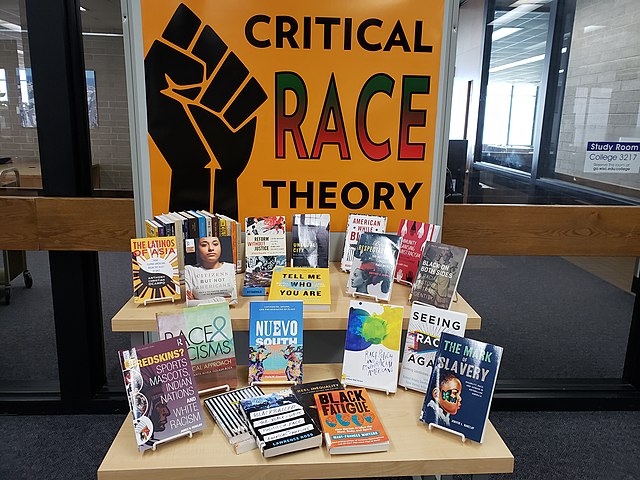The Bottom Line “Chaos” at California’s Temecula Valley School District CRT Workshop?
I was one of five panelists at the March 22 Temecula Valley Unified School District (TVUSD) Critical Race Theory (CRT) Workshop. The workshop provided parents and the larger Temecula community with details and the reasoning behind a resolution passed in December which preemptively banned the teaching of CRT in TVUSD schools. It also gave the community an opportunity to comment on the resolution as well as pose questions to the TVUSD school board and panelists. Covered widely by television and print news outlets, the event was commonly characterized as one that “descended into chaos.” Indeed, there were moments of chaos. But they were caused by unruly protesters that were at one point aided by board member Allison Barclay, who had voted against the resolution.
One moment of “chaos” that especially drove the news cycle by journalists eager to fan the flames of racial controversy rather than to inform the public was the fiery speech given during the public comment period given by Deon Hairston, a black teacher and pastor in the Temecula area. While I respect Mr. Hairston’s views, many of his statements were simply uninformed. First, Mr. Hairston’s argument that CRT shouldn’t have been banned by the school board since CRT “isn’t even taught in any K-12 classroom in the United States of America” is flatly wrong.
The truth is CRT philosophy and concepts are often taught in K-12 classrooms, if even if not directly attributed to CRT. The Manhattan Institute surveyed over 1,500 18- to 20-year-old students who have not yet graduated, or have recently graduated, from high schools. The results are startling. Regarding CRT-related concepts, 62% reported having been taught that America is systemically racist either in class or hearing it from an adult at school. 69% reported being taught or hearing that whites have “privilege.” 57% reported that whites carry an unconscious bias that negatively affects people of color. 53% reported they were taught or heard that America is a patriarchal society. As these are all key concepts of CRT, it is clearly being taught in K-12 classrooms in America, even if not part of a formal curriculum.
Hairston further charged that the school board’s “continued, blatant, willful ignorance of the black experience in this country,” is not only “shameful, but also detrimental to the education and growth of children.” Quoting Frederick Douglass’s famous 1852 speech regarding the Fourth of July being “yours not mine,” Hairston argued that the board had a problem with African-American history being taught, citing the 1960 Ruby Bridges incident in which a six-year-old was denied access to the all-white William Frantz Elementary School in New Orleans. The problem with his argument is that CRT has nothing to do with the teaching of black history – so the banning of CRT in K-12 is wholly unrelated to Frederick Douglass, Ruby Bridges, or any other historical racial incidents. CRT is neo-Marxist legal theory applied to race, not a history lesson.
As a black man who has faced my fair share of racism, I commiserate with Mr. Hairston and believe his feelings were sincere. But on an emotion-filled subject like CRT, accuracy is paramount. So I wish to make clear what CRT is and is not. As I presented in my remarks at the workshop, CRT had its beginnings in the 1970s, when a group of mostly black progressive lawyers, activists, and legal scholars across the country began to argue that the advances of the civil rights era of the 1960s had not only stalled but were being dismantled in areas such as legislative redistricting, affirmative action, criminal sentencing, and campus speech codes. They felt the courts were no longer taking race into account in redressing historic and current racial discrimination issues. They were especially alarmed by what they saw as the re-segregation of schools and a growing racial achievement gap in education.
CRT offers valid criticisms with respect to the current state of K-12 education, as there is clearly an achievement gap between white and Asian students relative to black and Hispanic students, and schools in urban areas are indeed mostly segregated. While I agree this was due to racism institutionalized by law decades ago, virtually all these laws have been struck down or overturned. Urban districts today have a high degree of ethnic diversity at administrative levels, along with ethnic leaders at the local and county levels. So to argue that lingering institutional racism is the sole factor for ongoing disparities is disingenuous. That said, inequities do remain in school funding, which is often distributed at the local level – thus mostly white suburban districts receive more funding than poor nonwhite districts.
In closing, it should be noted that a woman in the audience made a highly insensitive, unwarranted comment, suggesting Mr. Hairston find another place to live based on his comments. This resulted in an understandable outburst, in which he noted the long history of his family in this country. Continuing on after a second warning, he was asked to leave under a ground rule established at the beginning of the workshop. Several in the audience, mainly those opposed to the resolution, argued that the woman should also be excused from the meeting, to which the board finally agreed. I personally felt the woman should have been removed and Mr. Hairston be allowed to stay, as she clearly provoked his reaction. Given the current state of race relations, her comments, along with those of the media and protesters, only fanned the already raging flames of racial discord.


